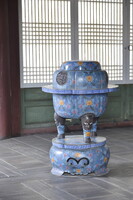Gyeongbokgung Palace
T’aejo, King of Korea

Download1A2-SK-GP-A72_cp.jpg (387.6Kb)
Alternate file
Alternative Title
Kyŏngbok Palace
Date
1395Description
Sajeongjeon (King's Meeting Hall) interior, ceramic brasier or censer; The largest of the Five Grand Palaces built by the Joseon dynasty, Gyeongbokgung served as the home of Kings of the Joseon [Chosŏn (medieval to modern) also known as Yi] dynasty, the Kings' households, as well as the government. The Yi dynasty ruled the Korean peninsula from 1392 to 1910, founded by Yi Sŏng-gye, posthumously known as King T’aejo (reigned 1392-1398). The palace was burnt and abandoned for three centuries following the Imjin War (1592-1598). In 1865-1872, all 7,700 rooms were restored along with 500 buildings over a 40 hectare site. In the early 20th century, much of the palace was systematically destroyed (all but 10 buildings) by Imperial Japan. Since the 1990s, the walled palace complex is gradually being reconstructed to its original form, with buildings built during Japanese occupation being pulled down, including the Japanese Government-General Building (removed 1996). By the end of 2009, it was estimated that approximately 40 percent of the structures that were standing before the Japanese occupation of Korea were restored or reconstructed; another 20 years of rebuilding is planned. Source: Wikipedia; http://en.wikipedia.org/wiki/Main_Page (accessed 6/29/2015)
Type of Work
royal palace; historic siteSubject
architecture, rulers and leaders, Korea--History--Japanese occupation, 1910-1945, Restoration and conservation, Yi (Korean culture or period)
Rights
Rights Statement
Licensed for educational and research use by the MIT community only